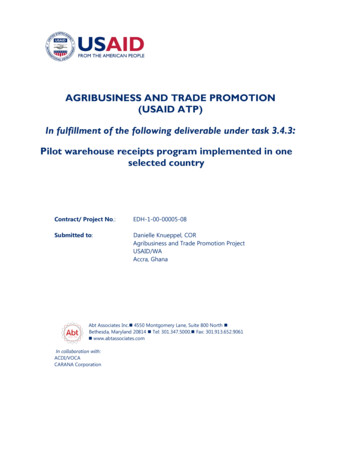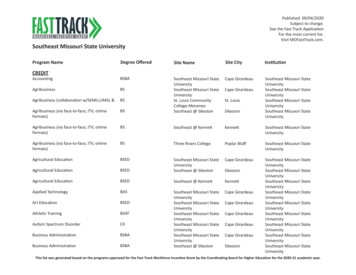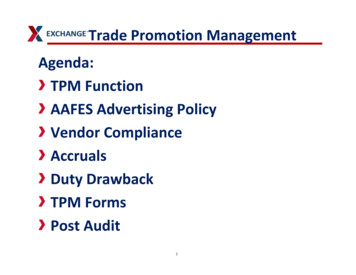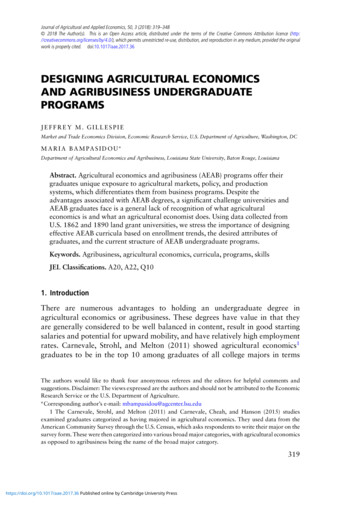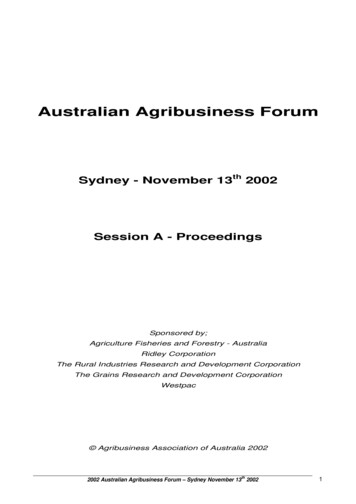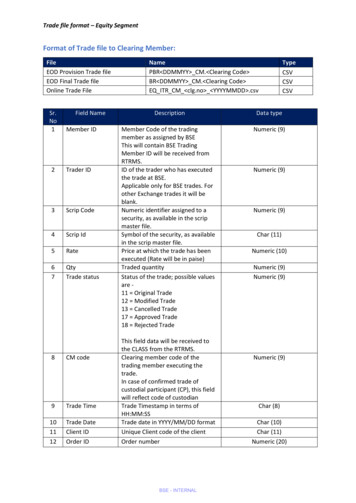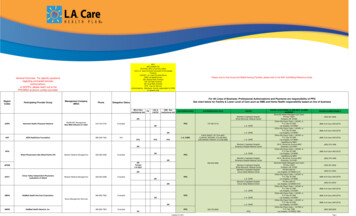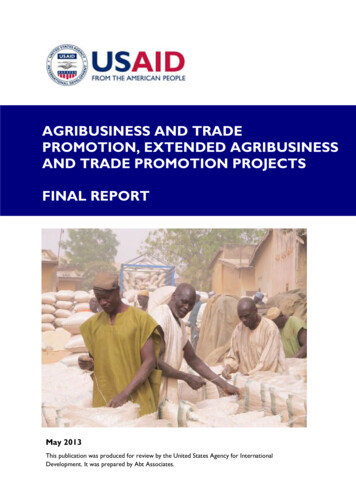
Transcription
AGRIBUSINESS AND TRADEPROMOTION, EXTENDED AGRIBUSINESSAND TRADE PROMOTION PROJECTSFINAL REPORTMay 2013This publication was produced for review by the United States Agency for InternationalDevelopment. It was prepared by Abt Associates.
Recommended Citation: Marjatta Eilittä et al., Chief of Party. “Agribusiness and Trade Promotion, ExtendedAgribusiness and Trade Promotion Projects—Final Report.” Prepared for the Agribusiness and Trade Promotionand Extended Agribusiness and Trade Promotion Projects by Abt Associates Inc., Bethesda, MD, May 2013.Contract/Project No.:EDH-I-00-05-00005-08, EDH-I-00-05-00005-11Submitted to:Danielle Knueppel, CORAgribusiness and Trade Promotion ProjectUSAID/WAAccra, GhanaPhotos: ATP/E-ATP staffCover photo: Maize being sacked in Dawanau market, December 2012.Abt Associates Inc. I 4550 Montgomery Avenue, Suite 800 North I Bethesda, Maryland 20814I Tel: 301.347.5000 I Fax: 301.913.9061 I www.abtassociates.comIn collaboration with:ACDI/VOCACARANA CorporationASVELISGlobal Cold Chain Alliance (GCCA)J.E. AUSTINBanyan Global
AGRIBUSINESS AND TRADEPROMOTION, EXTENDEDAGRIBUSINESS AND TRADEPROMOTION PROJECTSFINAL REPORTDISCLAIMERThe authors’ views expressed in this publication do not necessarily reflect the views of the United StatesAgency for International Development (USAID) or the United States Government.
TABLE OF CONTENTSAcronyms . iii1. Executive Summary . 12. Introduction . 72.1. Overview of the Two Projects. 82.2. Project Implementation Strategy. 92.3. The Implementing Consortium . 92.4. Organization of the Final Report . 103. Outcome 1: Significant Reduction of the Incidence of Physical andPolicy-Related Barriers to Intra-Regional Trade . 123.1. Transport-Related Physical and Policy Barriers to Trade . 123.2. Trade Policy-Related and Agricultural Policy-Related Barriers to Trade . 194. Outcome 2. Enhanced Linkages among Agricultural Producers,Agro-Input Suppliers, Agro-Processors, and Distributors . 304.1. Select Regional Private Sector Association Partners . 314.2. Create a Value Chain Development Plan and Build the Capacity of RegionalAssociations. 314.3. Build and Disseminate Replicable Business Models to Drive Trade. 484.4. Build Linkages and Support Transactions through Network of MarketFacilitators. 485. Outcome 3. More Effective Advocacy for Regional and NationalPolicies for Increased Regional Agricultural Trade . 565.1. Define Regional Advocacy Plans by Value Chain. 565.2. Provide Advocacy Assistance and Grants to Selected Apex and Value ChainOrganizations . 575.3. Support Advocacy on Regulations and Policy . 635.4. Support Key Events to Highlight Priority Issues. 636. Outcome 4. Improved Efficiency of Trade Transactions andRegional Market Access, Particularly via Improved RegionalMarket Information Systems . 656.1. Support the Development of Public and Private Market Information Systems. 656.2. Mobilize Finance for Agribusiness and Trade through DCA Guarantees withTwo Regional Banks . 696.3. Mobilize Finance in the Cereals Value Chain through Warehouse Receipts72iFinal Report: USAID Agribusiness and Trade Promotion/Extended Agribusiness and Trade Promotion
6.4. Mobilize Additional Investment through Public-Private Partnerships,Including GDAs . 736.5. Establish Public-Private Partnerships . 746.6. Provide Grants on a Competitive (and a Non-Competitive) Basis toCatalyze other Transformative Projects. 767. Outcome 5. Enhanced Capacity of Private Poultry and AnimalHealth Sectors to Reduce the Risk of AI Outbreaks andTransmission, and the Capacity to Recover after HPAI Outbreaks. 817.1. Build Capacity of Poultry Producers, Producer Organizations to Reduce AIOutbreaks . 827.2. Develop and Disseminate Models for Public-Private Cooperation In AIControl. 838. Cross-Cutting Issues . 858.1. Communications. 858.2. Gender . 869. Achievements, Lessons Learned and Recommendations for theFuture. 919.1. Direct Trade Facilitation. 929.2. Organizational Capacity Building. 969.3. Promotion of Product Competitiveness. 999.4. Road Harassment. 1039.5. Access to Financial Services. 1079.6. Access to Market Information. 1089.7. Policy Barriers to Trade . 1119.8. Documention and Highlighting of the Role of Regional Trade. 11410. Performance Indicator Reporting . 11610.1. Introduction . 11610.2. ATP. 11610.3. E-ATP . 12211. Project Management . 12811.1. Offices and Staffing . 12811.2. Management . 12911.3. Financial Analysis . 129iiFinal Report: USAID Agribusiness and Trade Promotion/Extended Agribusiness and Trade Promotion
ACRONYMSACFIME-CREDOAgence Communautaire pour le Financement de la Micro-Entreprise CREDOAcSSAActions pour la Sécurité et la Souveraineté Alimentaires au NigerADVANCEAgricultural Development and Value Chain EnhancementAGRISAgricultural Information SystemAGRITAAgribusiness and Trade AssociationAIAvian influenzaALCOAbidjan–Lagos Corridor OrganizationAMASSAAssociation Malienne pour la Sécurité et la Souveraineté AlimentairesANCARAgence Nationale de Conseil Agricole et RuralANOPACIAssociation Nationale des Organisations Professionnelles Agricoles de Côte d’IvoireANSATAgence Nationale de la Sécurité Alimentaire du TogoAPROSSAAssociation pour la Promotion de la Sécurité et de la Souveraineté Alimentaires auBurkina FasoASVELISAsian Veterinary and Livestock ServicesATPAgribusiness and Trade Promotion ProjectAU-NEPADAfrican Union’s New Partnership for Africa’s DevelopmentAusAIDAustralian Agency for International DevelopmentBOABank of AfricaCAADPComprehensive Africa Agriculture Development ProgramCBOCommunity-based organizationCCR-BConseil de Concertation des Riziculteurs du BéninCEMKCoopérative des Exploitants Motorisés de KoutialaCIAChambre Interdépartementale d’Agriculture (Borgou Alibori)CIC-BComité Interprofessionnel des Céréales du Burkina FasoCILSSComité Permanent Inter-états de Lutte contre la Sécheresse dans le SahelCIR-BComité Interprofessionnel des Riziculteurs du Burkina FasoCOFENABVI AOConfédération des Fédérations Nationales de la Filière Bétail/Viande de l’Afrique del’OuestCOOVAFCCICoopérative pour la Valorisation de la Filière Céréalière de Côte d’IvoireiiiFinal Report: USAID Agribusiness and Trade Promotion/Extended Agribusiness and Trade Promotion
CORPAOConférence Régionale Annuelle sur la Situation Agricole et Alimentaire et lesOpportunités d’Echanges de Produits Agricoles et Agro-alimentaire au Sahel en enAfrique de l’OuestCOVIMACoopérative des Vivriers de la MarahouéCPCCentrale des Producteurs de CéréalesCRSCatholic Relief ServicesCSOCivil society organizationCTACentre for Agricultural and Rural CooperationDCADevelopment Credit AuthorityDCoPDeputy Chief of PartyDOCDay-old chickE-ATPExpanded Agribusiness and Trade Promotion ProjectECOBIZEconomic Community of Business Information SystemsECOWAPEconomic Community of West African States Agricultural PolicyECOWASEconomic Community of West African StatesESOPEntreprises de Services aux Organisations des ProducteursETDEntreprise Territoire et DéveloppementETHEggs-to-hatchETLSECOWAS Trade Liberalization SchemeFAOFood and Agricultural Organization (United Nations)FARAForum for Agricultural Research in AfricaFCFAFrancs CFA (CFA Francs)FDAFoundation for Democracy in AfricaFEBECOVIFédération Nationale des Coopératives de la Filière Bétail/Viande de Côte d’IvoireFEBEVIBConfédération des Fédérations Nationales de la Filière Bétail-Viande du BurkinaFEBEVIMConfédération des Fédérations Nationales de la Filière Bétail-Viande du MaliFENABEVFédération Nationale de la Filière Bétail Viande du BéninFENACOPBVIFédération Nationale des Groupements Cooperatifs de Côte d'IvoireFENAGIP BVFédération Nationale des Groupements Interprofessionels Bétail Viande du NigerFEPABFédération des Professionnels Agricoles du BurkinaFIABFédération Nationale des Industries de l’Agro-Alimentaire et de Transformation duBurkina FasoFIARAFoire Internationale pour l’Agriculture et les Ressources AnimalesFIFAMFédération des Intervenants de la Filière Avicole du MaliFODELFonds de Développement de l’ElevageivFinal Report: USAID Agribusiness and Trade Promotion/Extended Agribusiness and Trade Promotion
FTFFeed the FutureFUPROFédération des Unions de Producteurs du BéninFWSFree Work ServicesGAPTOGhana Agricultural Producers and Traders OrganizationGDAGlobal Development AllianceGGCGhana Grains CouncilGHCGhana CediGICSociété Générale d’Investissement et de CommerceGIZGesellschaft für Internationalle ZusammenarbeitGNAPFGhana National Association of Poultry FarmersGPAGroupement Professionnel AgricoleGRIBGhana Rice Inter-professional BodyGSRDIGreen Sahel and Rural Development InitiativesICMIntegrated crop managementIFAnetInformation Aid NetworkIFDCInternational Center for Soil Fertility and Agricultural DevelopmentIICEMInitiatives Intégrées pour la Croissance Economique au MaliIMCIInter-profession du Maïs de Côte d’IvoireINERAInstitut de l'Environnement et de Recherches AgricolesINTSORMILInternational Sorghum and Millet Collaborative Research Support ProgramIPMIntegrated pest managementIRTGImproved Road Transport GovernanceISFMIntegrated soil fertility managementITInformation technologyJAALJournées Agro-AlimentairesM&EMonitoring and evaluationMCAMillennium Challenge AccountMELSMeunerie et Emballage de Légumes Secs, Farine et Semoule de CéréalesMIR PlusMarketing Input Regionally Plus ProjectMISMarket information systemMISTOWAMarket Information Systems and Traders' Organizations for West AfricaMOBMaîtrise d’Ouvrage de BagréMOUMemorandum of understandingMTMetric tonsvFinal Report: USAID Agribusiness and Trade Promotion/Extended Agribusiness and Trade Promotion
NACNational Approvals CommitteeNAFASONeema Agricole du FasoNGONongovernmental organizationOCALOrganisation du Corridor Abidjan-LagosOIEWorld Animal Health OrganizationONFOObservatoire Nationale de la Filière Oignon du Burkina FasoOPAObservatoire des Pratiques AnormalesORO/AOCObservatoire Régionale de l’Oignon en Afrique de l’Ouest et du CentrePAFASPProjet d’appui aux filières agro-sylvo-pastoralesPANPoultry Association of NigeriaPCEProjet de Croissance EconomiquePIVAPartner institution viability assessmentPPPPublic-private partnershipPRODEXProjet de Développement des Exportations et des Marchés Agro-Sylvo-Pastoraux duNigerPRODIAKTProjet de Promotion et de Diversification de l'Agriculture dans les Régions deKaolack, Kaffrine, Kédougou et TambacoundaRESIMAORéseau des Systèmes d’Information de Marché de l’Afrique de l’OuestRIFANRice Farmers Associations of NigeriaRTCFRéseau des Transformatrices Céréalières du FasoSCABSociété des Coopératives Agricoles de BanzonSEGAS-BFSociété d’Entreposage, de Gestion de Garantie et de Sûretés Burkina FasoSITRACSociété Industrielle pour la Transformation et la Commercialisation des CéréalesSODEPALSociété d'Exploitation du Parc de la LékédiSRISystem of Rice IntensificationSWOTStrengths, weaknesses, opportunities, and threatsToTTraining of trainersUBAUnited Bank of AfricaUCOVISAUnion des Coopératives du Vivrier des SavanesUEMOAUnion Economique et Monétaire Ouest AfricaineUGCPA-BMUnion des Groupements pour la Commercialisation des Produits Agricoles de laBoucle du MouhounUGER-BUnion des Groupements d’Etuveuses de Riz de BamaUNACOBVIUnion Nationale des Commerçants de la Filière Bétail-ViandeUNAFAUnion Nationale des Acteurs de la Filière Avicole du SénégalviFinal Report: USAID Agribusiness and Trade Promotion/Extended Agribusiness and Trade Promotion
UNERizUnion Nationale des Etuveuses de RizUNICAPUnion des Coopératives Agro-PastoralesUOFAUnion des Organisations de la Filière AvicoleUPPA-HUnion Professionnelle des Professionnels Agricoles du HouetUSADFU.S. African Development FoundationUSAIDUnited States Agency for International DevelopmentUSAID/WAUSAID/West AfricaUSGUnited States GovernmentVATValue-added taxVCDPValue chain development planWAGNWest Africa Grains NetworkWAMIWest African Monetary InstituteWASAWest African Seed AllianceWATHWest Africa Trade HubWFPWorld Food ProgrammeviiFinal Report: USAID Agribusiness and Trade Promotion/Extended Agribusiness and Trade Promotion
1.EXECUTIVE SUMMARYRegional trade plays a key role in food security and income generation in West Africa. With variations inregional agro-ecologies and year-to-year variability in rainfall, trade in West Africa is a significantstabilizer of food availability. It also provides markets for numerous producers, traders, and processors.Regional trade contributes significantly to incomes and food security in both Sahelian and coastalcountries. Sahelian countries provide important commodities such as livestock, onions, and cowpeas forregional markets and are recipients of foodstuffs, particularly cereals, from the more humid, coastalareas. Coastal countries are avid consumers of Sahelian products and are also producers, particularly ofcereals.At the same time, however, West Africa’s trading environment remains in many ways inhospitable totrade in locally produced staple commodities. Critical constraints to well-functioning regional marketsinclude a poor enabling environment, especially the lack of (or poor implementation of) regionalprotocols; physical and policy barriers; weak links across regional value chains; limited marketinformation and support services such as finance; and poor private sector practices in supply chainmanagement, which contribute to high transport costs. In addition, private regional value chainorganizations, which can potentially play a key role in pushing for change, are commonly weak. Only ifthese constraints are addressed can regional trade reach its potential to serve as a vehicle for improvingfood security and income generation in the future.The Agribusiness and Trade Promotion (ATP) Project and the Expanded Agribusiness and TradePromotion (E-ATP) Project (discussed jointly as “the project”) operated from 2008 to 2013 to addressthe challenges of West African regional trade in staple commodities. Funded by the United StatesAgency for International Development/West Africa, and working to contribute to the implementation ofUSAID/West Africa’s Feed the Future Multi-Year Strategy, their goal was to increase intra-regional tradein the region’s staple commodities of maize, onion, livestock (under ATP) and millet/sorghum, rice, andpoultry (under E-ATP).The project was implemented by a consortium led by Abt Associates Inc. in close collaboration withregional, national, and local stakeholders. The project considered its role as catalytic, providing partnerswith technical and, if needed, financial support to help them develop, adopt, and implement an agendafor change, including an agenda for institutional growth within their own organizations. With a staff of 50at its peak, the project operated from two main offices (a head office in Accra and a technical office inOuagadougou) and a small satellite office in Kano, Nigeria. This final report describes the project’sactivities and achievements, the lessons learned from its implementation, and recommendations forfuture work.Activities. During the five years of ATP and almost four years of E-ATP, the project implemented awide array of activities with the goal of increasing regional trade. Activities ranged from thoseimplemented solely by the project, to those implemented in collaboration with partners, to thoseimplemented by partners with at least some financial support from the project. A complete summary isimpossible, given the number of activities, but highlights include the following:1Final Report: USAID Agribusiness and Trade Promotion/Extended Agribusiness and Trade Promotion
To increase volumes and improve the quality of production, the project trained almost 26,000individuals in sustainable production, post-harvest, and processing technologies, including integratedcrop management and conservation tillage, quality storage, improved butchering and cattle-fatteningtechnologies, the System of Rice Intensification, and improved parboiling of rice. In all, trainingparticipants totaled 22,212 (4,425 of whom were women) under ATP and 3,704 (of whom 1,260were women) under E-ATP. To support its partner organizations, including both regional and national private sector associations,the project used a slightly expanded version of the Partner Institutional Viability Assessment (PIVA)tool. The project engaged its 11 core partners’ members in structured, annual self-evaluations and indevelopment of capacity building plans that were implemented with technical support and projectgrants for the associations’ priority activities. In addition, the partner associations frequentlyimplemented project-organized technical trainings (which helped them learn to provide memberservices) and collected trade data with the project. Advocacy was an important element of theassociations’ efforts. The project developed a partner-operated methodology, based on having data collectors present inkey markets, to quantify trade flows in principal corridors for the staple commodities of maize,millet/sorghum, rice, livestock, and onion. This system was directed by the project for four years. To create a high-visibility forum in support of stakeholders impatient for a more conducive tradingenvironment, the project organized the January 2013 Food Across Borders conference cosponsored by USAID and the Economic Community of West African States (ECOWAS), whichmade the case that regional trade is a significant but underappreciated contributor to food securityin West Africa. The conference also pointed out that regional trade needs improved conditions if itis to flourish and meet the region’s growing food security challenges. The project promoted theimportance of involving the value chain associations and their concerns in Borderless Alliance, theumbrella-level advocacy organization, which originally consisted mainly of larger companies. The project supported efforts to build a regional forum for cereals actors, through a grant to theComité Interprofessionnel des Céréales du Burkina Faso (CIC-B), which worked with cereals actors ineight countries to organize nationally, promote collaboration, and eventually form the West AfricaGrains Network. The project developed a staple commodity corridor-focused approach to collecting data on roadharassment along six corridors. The project’s efforts to reduce road harassment included marketshows and coaching for drivers and truckers. Working with 10 companies in formal public-private partnership frameworks, the project engaged indiverse activities in procurement, processing, packaging, marketing, and access to finance. The project worked with the market information system (MIS) provider Esoko and with MISpartners in Burkina Faso, Côte d’Ivoire, Mali, and Nigeria to transmit market information to valuechain actors. By the end of FY 2012, the system had 36,357 registered users. The Policy Watch System at ECOWAS, which the project developed and worked to put in place,serves as a tool to assess the implementation of agreed-upon regional trade policies.Working on staple commodity trade in the West African regional context is complex. Partners andbeneficiaries are dispersed in nine target countries; trade flows are complicated, diffuse, and hard to2Final Report: USAID Agribusiness and Trade Promotion/Extended Agribusiness and Trade Promotion
track; and impediments to trade involve a myriad of causes, from poor infrastructure to limitededucation, from vested interests at different levels to deep-rooted traditional practices, and frominstitutional weaknesses within regional organizations to the still-evolving political will for regionalintegration at the national level—just to name a few. In most areas, change is difficult and slow. Theingredients for change are also complex, and although concrete, quantifiable accomplishments may bringa certain level of comfort, more qualitative achievements—which may be considered nebulous—caneventually lead to changes that yield concrete benefits in the future.Achievements. For the reasons articulated above, this report presents achievements of differentkinds, including those highlighted below. The project: Improved understanding of the true extent of regional trade and developed a regional resource out of thetrade data collection. The project’s trade data collection contributed to improving understanding ofvolumes and patterns of trade. To contribute to the sustainability of the trade data collectioneffort, in 2012 the project worked closely with the Comité Permanent Inter-états de Lutte contre laSécheresse dans le Sahel (CILSS) to hand over the data collection at the project’s end. CILSS wasscheduled to start funding the data collection grants from January 2013 onwards, but asked if ATPcould continue funding them until March 15, 2013. Since April 1, 2013, data collection has beenunder CILSS leadership. CILSS has entered into contracts with the project’s partner organizationsand former project staff responsible for the data collection have taken positions at CILSS. Highlighted the important connection between regional trade and food security, and thereby helpedadvance dialogue on food security as a regional rather than national concept. Food Across Bordersmade the arguments, based on project data, that the extent of regional trade is far greater thanoriginally believed and that given these trade flows, regional trade is an important contributor tofood security and that its importance will increase. It advanced the concept that food security isbest met through true regional integration. These ideas are beginning to take hold in West Africanow. Helped give a face to regional trade and those involved in it, thereby advancing the dialogue on (andpushing the agenda for) ways to address constraints to regional trade. This was the result of variousefforts with project partners that highlighted them, their roles, and their collective strength andcontributions. Helped develop the Confédération des Fédérations Nationales de la Filière Bétail/Viande de l’Afrique del’Ouest (COFENABVI AO) to become a more regional actor with a strong advocacy voice,permanent secretariat, and participation in the Borderless Alliance which will help shape theagenda of the Alliance to include concerns related to staple commodity trade. In addition, theproject fostered organizational structures, membership services, and advocacy capacity in 10 otherorganizations. Helped coach and develop the West Africa Grains Network (WAGN), which was formally established inMarch 2013. WAGN is an umbrella organization at the regional level for diverse cereal value chainactors, both associations and companies. During its final months, the project secured a number oftechnical and financial partners that will continue to work with WAGN. Reduced road harassment in key corridors. The project quantified transport obstacles based onfeedback from 1,536 truckers and traders and reduced road harassment in most, although not inall corridors.3Final Report: USAID Agribusiness and Trade Promotion/Extended Agribusiness and Trade Promotion
Completed eight public-private partnership agreements which helped mobilize 2.63 million by the privatesector.Lessons learned. The project articulated the following lessons learned:On facilitating trade transactions: The facilitation of trade transactions can be hampered by national decision makers’ inadequateunderstanding of the role of regional trade caused in part by an insufficient appreciation of the valueof imports and exports, as their precise quantities are unknown. This causes miscalculations of foodavailability at the national level and leads to an erroneous emphasis on national food security andrelated policy actions such as export bans. Although such policies may seem designed to protectconsumers’ interests, they limit the expansion of trade, which could bring even greater benefits tothe country. An overly national focus also impedes the formalization and modernization of trade andkeeps it going through the back door. Public institutions’ misguided procurement policies – from governments, instead of the privatesector – present a threat to private sector regional trading in the future.On institutional support: Fostering institutional development requires considerable skill and time; allocation of sufficientresources is important. Articulation of clear, even if minimal, expectations for cost-sharing from organizations participatingin the project promotes a sense of ownership and builds sustainability. Likewise it is important to tieinstitutional development activities to clear business objectives of their members, e.g., increasedtrade.On enhancing product competitiveness: Developing a common understanding of the division of roles and responsibilities with bilateralprojects is important. In many cases, regional projects can step back and focus on one particularniche, as bilateral projects have a general comparative advantage in this area.On improving road governance: Collecting good-quality road harassment data is a challenge, and comes only from repeated checkingat the field level.On provision of market information: Successes in market information systems take time, as they require many complex elements tocome together: facilitation of relationships between providers, partners, and value chain actors, aswell as training and development of systems of data collection. It is challenging to find functioning models for sustainable private systems in the smallholderagriculture context. Regionally, within the project’s time frame, there was little progress in thisregard. Current operation of private sector MIS in West Africa is largely based on public sectorfunding.4Final Report: USAID Agribusiness and Trade Promotion/Extended Agribusiness and Trade Promotion
If the focus is on transactions, information on price and availability is only the first step. In otherwords: real-time information does not necessarily translate into real-time opportunities. This isparticularly the case in regional trade.On facilitating policy change: Real change comes from the bottom-up, involving the private sector coupled with national andregional decision-makers who are in a position to respond to stakeholders’ concerns and takeaction. Many obstacles to regional trade originate from complex webs that involve many ac
Agribusiness and Trade Promotion Projects—Final Report." Prepared for the Agribusiness and Trade Promotion and Extended Agribusiness and Trade Promotion Projects by Abt Associates Inc., Bethesda, MD, May 2013. Contract/Project No.: EDH-I-00-05-00005-08, EDH-I-00-05-00005-11 Submitted to: Danielle Knueppel, COR Agribusiness and Trade .
